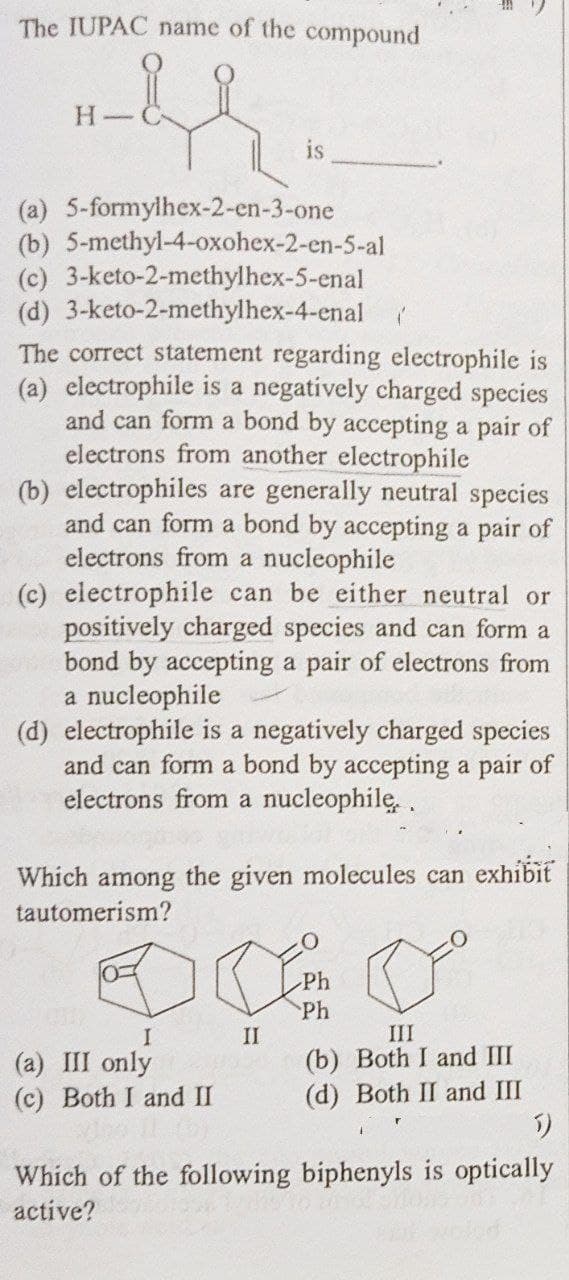The IUPAC name of the compound is (a) 5-formylhex-2-en-3-one (b) 5-methyl-4-oxohex-2-en-5-al (c) 3-keto-2-methylhex-5-enal (d) 3-keto-2-methylhex-4-enal The correct statement regarding electrophile is (a) electrophile is a negatively charged species and can form a bond by accepting a pair of electrons from another electrophile (b) electrophiles are generally neutral species and can form a bond by accepting a pair of electrons from a nucleophile (c) electrophile can be either neutral or positively charged species and can form a bond by accepting a pair of electrons from a nucleophile (d) electrophile is a negatively charged species and can form a bond by accepting a pair of electrons from a nucleophile, . Which among the given molecules can exhibit tautomerism? Ph Ph I II III (b) Both I and III (a) III only (c) Both I and II (d) Both II and III 5) Which of the following biphenyls is optically active?
The IUPAC name of the compound is (a) 5-formylhex-2-en-3-one (b) 5-methyl-4-oxohex-2-en-5-al (c) 3-keto-2-methylhex-5-enal (d) 3-keto-2-methylhex-4-enal The correct statement regarding electrophile is (a) electrophile is a negatively charged species and can form a bond by accepting a pair of electrons from another electrophile (b) electrophiles are generally neutral species and can form a bond by accepting a pair of electrons from a nucleophile (c) electrophile can be either neutral or positively charged species and can form a bond by accepting a pair of electrons from a nucleophile (d) electrophile is a negatively charged species and can form a bond by accepting a pair of electrons from a nucleophile, . Which among the given molecules can exhibit tautomerism? Ph Ph I II III (b) Both I and III (a) III only (c) Both I and II (d) Both II and III 5) Which of the following biphenyls is optically active?
Organic Chemistry
8th Edition
ISBN:9781305580350
Author:William H. Brown, Brent L. Iverson, Eric Anslyn, Christopher S. Foote
Publisher:William H. Brown, Brent L. Iverson, Eric Anslyn, Christopher S. Foote
Chapter17: Carboxylic Acids
Section: Chapter Questions
Problem 17.9P
Related questions
Question

Transcribed Image Text:The IUPAC name of the compound
is
(a) 5-formylhex-2-en-3-one
(b) 5-methyl-4-oxohex-2-en-5-al
(c) 3-keto-2-methylhex-5-enal
(d) 3-keto-2-methylhex-4-enal
The correct statement regarding electrophile is
(a) electrophile is a negatively charged species
and can form a bond by accepting a pair of
electrons from another electrophile
(b) electrophiles are generally neutral species
and can form a bond by accepting a pair of
electrons from a nucleophile
(c) electrophile can be either neutral or
positively charged species and can form a
bond by accepting a pair of electrons from
a nucleophile
(d) electrophile is a negatively charged species
and can form a bond by accepting a pair of
electrons from a nucleophile,
Which among the given molecules can exhibit
tautomerism?
Ph
Ph
I
III
(a) III only
(b) Both I and III
(d) Both II and III
(c) Both I and II
5)
Which of the following biphenyls is optically
active?
II
Expert Solution
This question has been solved!
Explore an expertly crafted, step-by-step solution for a thorough understanding of key concepts.
Step by step
Solved in 2 steps with 1 images

Knowledge Booster
Learn more about
Need a deep-dive on the concept behind this application? Look no further. Learn more about this topic, chemistry and related others by exploring similar questions and additional content below.Recommended textbooks for you

Organic Chemistry
Chemistry
ISBN:
9781305580350
Author:
William H. Brown, Brent L. Iverson, Eric Anslyn, Christopher S. Foote
Publisher:
Cengage Learning

Chemistry for Today: General, Organic, and Bioche…
Chemistry
ISBN:
9781305960060
Author:
Spencer L. Seager, Michael R. Slabaugh, Maren S. Hansen
Publisher:
Cengage Learning


Organic Chemistry
Chemistry
ISBN:
9781305580350
Author:
William H. Brown, Brent L. Iverson, Eric Anslyn, Christopher S. Foote
Publisher:
Cengage Learning

Chemistry for Today: General, Organic, and Bioche…
Chemistry
ISBN:
9781305960060
Author:
Spencer L. Seager, Michael R. Slabaugh, Maren S. Hansen
Publisher:
Cengage Learning
